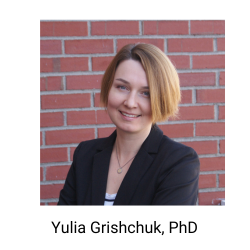 Yulia Grishchuk, PhD, an assistant investigator in the Center for Genomic Medicine at Massachusetts General Hospital and an assistant professor of Neurology at Harvard Medical School, is co-corresponding author of a new study in Molecular Therapy – Methods and Clinical Development, A Blood-Brain Barrier Penetrant AAV Gene Therapy Improves Neurologic Function in Symptomatic Mucolipidosis IV Mice.
Yulia Grishchuk, PhD, an assistant investigator in the Center for Genomic Medicine at Massachusetts General Hospital and an assistant professor of Neurology at Harvard Medical School, is co-corresponding author of a new study in Molecular Therapy – Methods and Clinical Development, A Blood-Brain Barrier Penetrant AAV Gene Therapy Improves Neurologic Function in Symptomatic Mucolipidosis IV Mice.
Fengfeng Bei, PhD, a principal investigator in the Department of Neurosurgery at Brigham and Women's Hospital and an assistant professor of Neurosurgery at Harvard Medical School, is co-corresponding author of the study.
What is the Background for this Study?
Mucolipidosis IV (MLIV) is a rare neurologic disease of childhood with extremely high unmet need. This study shows efficacy of gene supplementation approach using a novel AAV-vector with enhanced ability to cross blood-brain barrier to improve neurologic symptoms and life-span in the mouse model of the, mucolipidosis IV.
What Were the Results?
We showed significant and dose-dependent improvement of neurologic function and reduction of brain pathology in the knock-out animals treated with the AAV-CPP16 vector expressing human MCOLN1 gene. Importantly, these treatment benefits were observed in animal treated after onset of neurologic dysfunction, suggesting successful recovery of neurologic function.
What are the Clinical Implications and Next Steps?
AAV-mediated gene therapy is a promising therapeutic strategy for mucolipidosis IV, that warrants speedy translation into clinic.
Paper Cited
Madison L. Sangster, Martha M. Bishop, Yizheng Yao, Jessica F. Feitor, Sanjid Shahriar, Maxwell E. Miller, Anil K. Chekuri, Bogdan Budnik, Fengfeng Bei, Yulia Grishchuk, A blood-brain barrier-penetrant AAV gene therapy improves neurological function in symptomatic mucolipidosis IV mice, Molecular Therapy - Methods & Clinical Development, Volume 32, Issue 2, 2024, 101269, ISSN 2329-0501,
https://doi.org/10.1016/j.omtm.2024.101269. (https://www.sciencedirect.com/science/article/pii/S2329050124000858)

 Yulia Grishchuk, PhD, an assistant investigator in the Center for Genomic Medicine at Massachusetts General Hospital and an assistant professor of Neurology at Harvard Medical School, is co-corresponding author of a new study in Molecular Therapy – Methods and Clinical Development,
Yulia Grishchuk, PhD, an assistant investigator in the Center for Genomic Medicine at Massachusetts General Hospital and an assistant professor of Neurology at Harvard Medical School, is co-corresponding author of a new study in Molecular Therapy – Methods and Clinical Development,